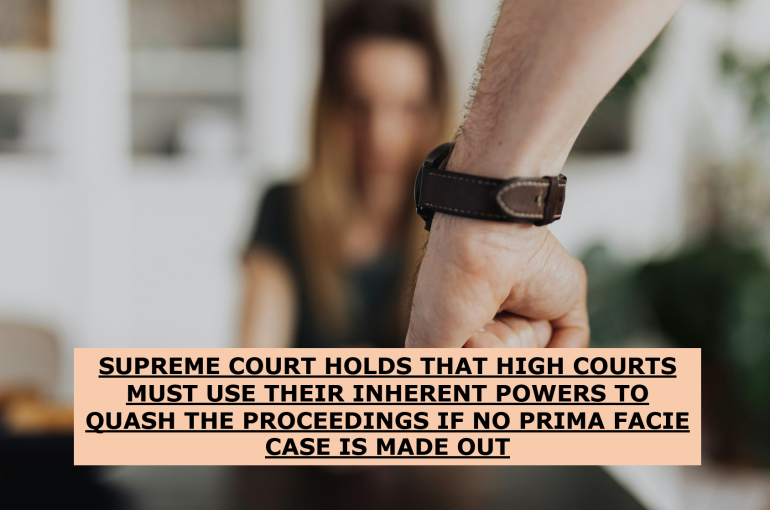SUPREME COURT HOLDS HIGH COURTS MUST USE INHERENT POWERS TO QUASH THE PROCEEDINGS IF NO PRIMA FACIE CASE IS MADE OUT
A two Judge Bench of the Hon’ble Supreme Court comprising of Justice B.R. Gavai and Justice K. V. Viswanathan passed a judgement in Digambar and Anr. vs. the State of Maharashtra and Anr. SLP (Crl.) No.2122 of 2020 wherein the Bench held that vague, generalized, or retaliatory allegations in matrimonial disputes should not be allowed to proceed unchecked, ensuring justice for accused against undue harassment.
Facts
The Complainant married Madhav Suryawanshi (son of the Appellants herein) in 2006 and the couple had two daughters. After the birth of the second daughter in 2011, the Complainant alleged that her in-laws and husband pressured her to have a male child.
The Complainant accused the Appellants and her husband of subjecting her to mental and physical cruelty for failing to bear a son.
The Complainant alleged that on 28.11.2016, the Appellants and her husband visited her in Latur and coerced her to consume food they had prepared. This resulted in severe stomach pain and bleeding, leading to a miscarriage. Subsequent to the event, medical tests were done which revealed remnants of the foetus in her womb.
Due to persistent ill-treatment, the Complainant began living separately in February 2018. On 06.11.2018, FIR No. 339 of 2018 was registered at Shivaji Nagar Police Station, Latur, under Section 498-A (Husband or relative of husband of a woman subjecting her to cruelty), Section 312 (Causing miscarriage), Section 313 (Causing miscarriage without woman’s consent), and Section 34 (Acts done by several persons in furtherance of common intention) of the Indian Penal Code 1860 (IPC) against the husband and the in-laws.
Following this, on 20.05.2019, the Family Court at Latur granted a mutual divorce between the Complainant and Madhav.
The Appellants filed an Application under Section 482 of the Code of Criminal Procedure (CrPC) (Inherent powers of the High Court) to quash the FIR, arguing that the allegations were baseless and fabricated.
The Hon’ble High Court of Bombay, Aurangabad Bench, dismissed the Application on 23.01.2020 providing that there was sufficient evidence to proceed against the Appellants. Subsequently, the Appellants filed an Appeal against the decision of the High Court in the Hon’ble Supreme Court.
A Charge-sheet was filed by the Police on 08.02.2021, during the pendency of the Appeal in the Supreme Court. The Complainant alleged persistent physical and mental cruelty by her husband and in-laws due to her inability to produce a male child.
Contentions by the Appellants
The Appellants argued they were falsely implicated due to the matrimonial discord between the Complainant and their son. They claimed the allegations were vague, without specific details of cruelty, and motivated by an intent to pressurize them into acceding to the Complainant’s demands during the divorce proceedings.
The Appellants also highlighted that no direct evidence connected them to the alleged miscarriage and that the FIR was filed long after the alleged incidents.
Issues
- Whether the allegations levelled by the Complainant were backed by sufficient evidence to convict the husband and the Appellants?
- Whether the Hon’ble High Court erred in rejecting the Petition for quashing of FIR?
Decision by the Supreme Court
The Apex Court noted the FIR lacked specific instances or details of cruelty and harassment. It held that vague and omnibus allegations could not sustain criminal prosecution. The Hon’ble Court also noted that the Complainant delayed filing the FIR by almost two years after the alleged incidents, raising questions about its genuineness, particularly as she had already moved out and sought divorce.
Moreover, the doctor who examined the Complainant stated that the miscarriage was likely caused by abortion pills and not poisoned food. There was no evidence linking the Appellants to the miscarriage.
Referring to precedents, including State of Haryana and Ors. v. Bhajan Lal 1992 Supp (1) SCC 335, the Court emphasized the need to quash proceedings initiated with malafide intent or based on improbable allegations. Thus, the Hon’ble Bench was of the view that the Complainant had failed to prove the allegations against the Appellants and the High Court should have exercised its inherent powers to quash the baseless criminal proceedings against the in-laws.
Conclusion
The Supreme Court allowed the appeal, quashing the FIR and all subsequent proceedings against the Appellants. The judgment emphasized the necessity of scrutinizing allegations for credibility and intent to prevent misuse of legal provisions like Section 498-A IPC. Furthermore, the Apex Court criticized the High Court for failing to exercise its powers to quash the FIR despite the lack of a prima facie case.
ARJAV JAIN
ASSOCIATE
THE INDIAN LAWYER & ALLIED SERVICES





































Leave a Reply